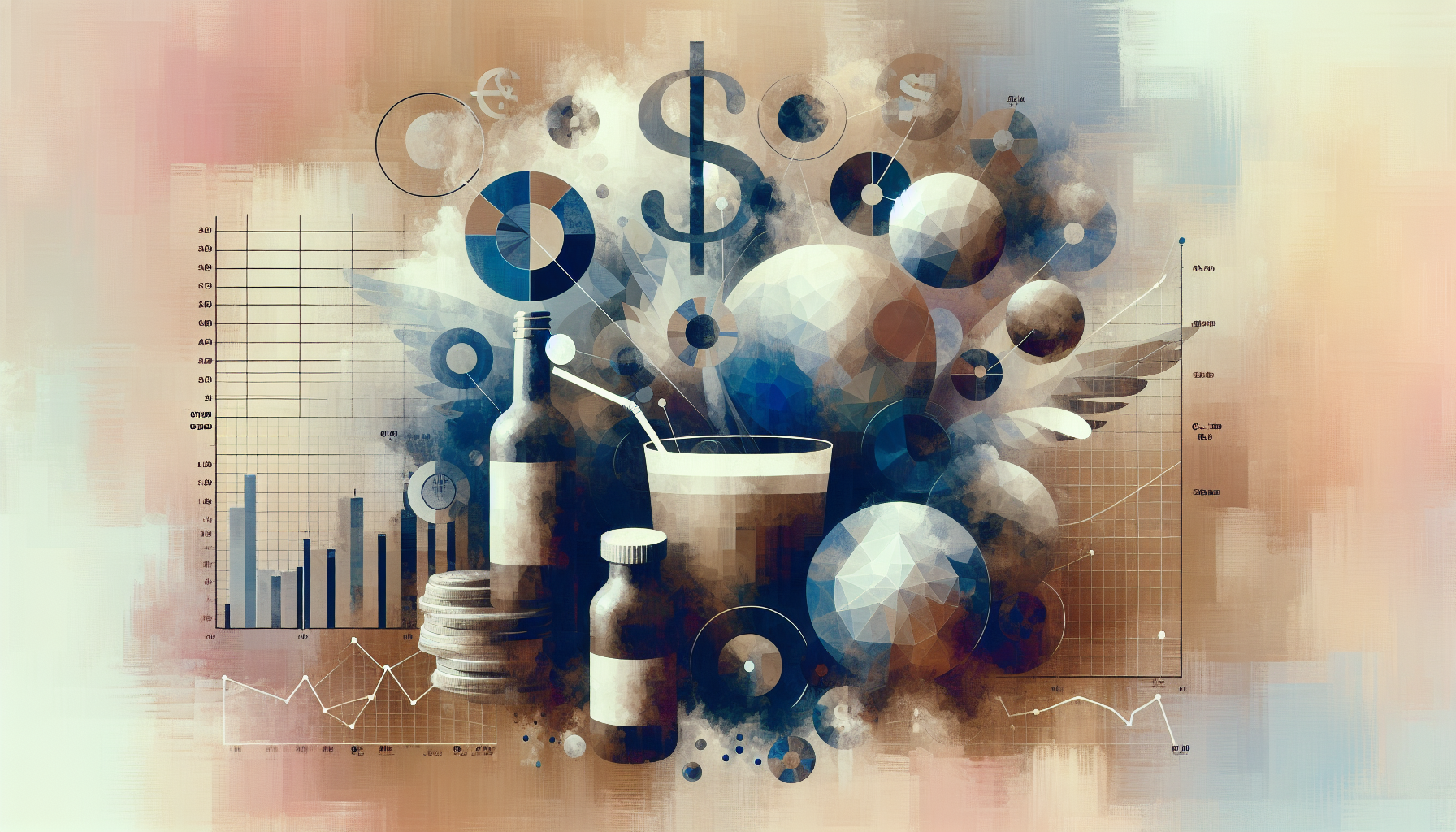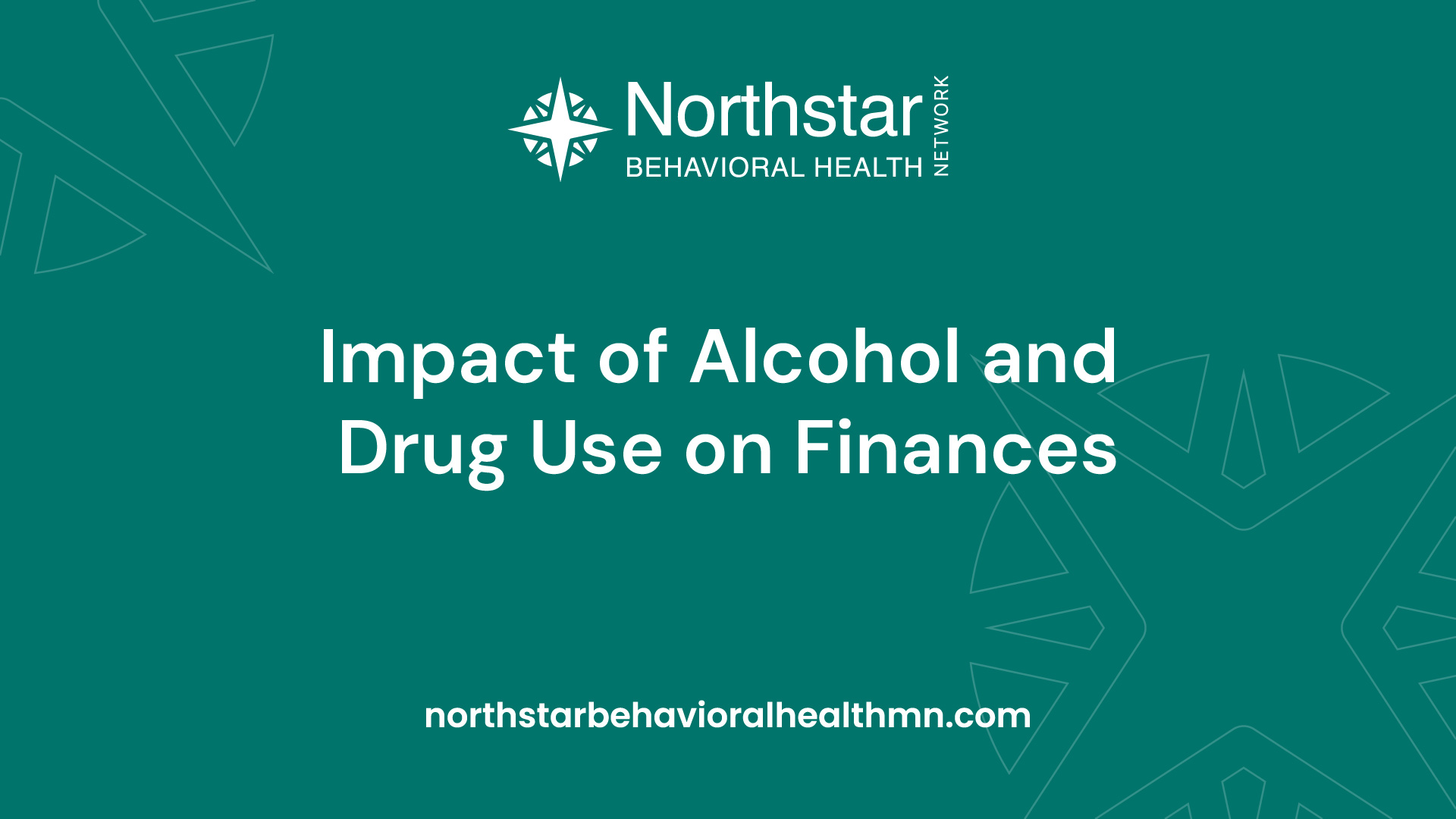August 4, 2024
Escaping The Economic Effects Of Alcohol And Drugs
Discover strategies to rebuild financial stability and thrive in recovery.


Understanding the Economic Effects
When it comes to alcohol and drug use, the economic effects can be significant and far-reaching. Understanding these effects is an important step towards breaking free from addiction. In this section, we will explore the impact of alcohol and drug use on finances and uncover the hidden costs of addiction.
Impact of Alcohol and Drug Use on Finances

Alcohol and drug use can have a profound impact on an individual's financial well-being. The excessive spending on substances can quickly drain bank accounts and lead to financial instability. Some of the common financial consequences of alcohol and drug use include:
- Cost of the substances: The recurring expenses associated with purchasing alcohol or drugs can add up over time. Whether it's daily purchases or larger quantities bought in bulk, the financial burden can be substantial.
- Healthcare expenses: Substance abuse often leads to health issues that require medical attention. The cost of hospital visits, doctor consultations, and medications can put a strain on finances, especially if insurance coverage is inadequate or nonexistent.
- Legal consequences: Engaging in illegal activities, such as drug possession or driving under the influence, can result in legal fees, fines, and even incarceration. These legal consequences can have a significant financial impact on individuals and their families.
- Loss of income: Addiction can interfere with an individual's ability to maintain stable employment. Absenteeism, decreased productivity, and job loss can result in a loss of income, making it challenging to meet financial obligations.
It's crucial to acknowledge the detrimental effects of alcohol and drug use on finances in order to take the necessary steps towards recovery. If you or someone you know is struggling with addiction, seeking professional help and support is essential. Consider reaching out to addiction treatment centers or support groups for guidance. For more information on finding the right resources, refer to our articles on difficulty finding an outpatient drug rehab that serves the LGBTQ population? and finding accredited heroin rehab centers to help you get clean.
Hidden Costs of Addiction
In addition to the direct financial impact, addiction also comes with hidden costs that can further exacerbate the economic effects. These hidden costs may include:
- Relationship strain: Addiction can strain relationships with family, friends, and colleagues. Repairing these relationships may require time, effort, and potentially financial support.
- Decline in mental health: Substance abuse often coexists with mental health issues. The cost of seeking therapy, counseling, or medication to address these underlying mental health conditions can contribute to the overall financial burden.
- Lowered credit score: Financial instability caused by addiction can lead to missed payments, defaulting on loans, and a decrease in credit score. This can make it difficult to secure future loans or credit, impacting financial opportunities.
- Opportunity cost: Addiction can consume time, energy, and resources that could have been invested in personal and professional growth. Missed educational or career opportunities may result in long-term financial setbacks.
By recognizing and understanding the economic effects of alcohol and drug use, individuals can take proactive steps towards breaking free from addiction. In the following sections, we will explore how to acknowledge the problem and seek support and guidance in order to begin the journey towards recovery.
Breaking the Chains: Taking the First Steps
Embarking on the journey towards recovery from addiction can be challenging, but it is a courageous step towards reclaiming control over your life. Taking the first steps involves acknowledging the problem and seeking support and guidance from others who can help you along the way.
Acknowledging the Problem
The first vital step in breaking free from the economic effects of alcohol and drugs is acknowledging that there is a problem. This self-awareness is crucial in recognizing the impact that addiction has had on your finances and overall well-being. It takes strength to confront the reality of the situation and acknowledge that changes need to be made.
Reflect on the financial consequences that addiction has brought into your life. Consider the money spent on substances, the missed work opportunities, and the debts that may have accumulated. Understanding the extent of the economic effects can serve as a powerful motivator to take action and seek a better future.
Seeking Support and Guidance
Once you have recognized the need for change, seeking support and guidance is essential. You don't have to face the challenges alone. There are numerous resources available to help you navigate the path to recovery.
Consider reaching out to addiction counselors, therapists, or support groups that specialize in substance abuse. These professionals can provide you with the guidance, tools, and coping strategies necessary to overcome addiction and rebuild your life. They can also help you address the financial aspects of recovery and provide advice on managing your finances during this transition.
In addition to professional help, lean on your support network of family and friends. Their encouragement, understanding, and non-judgmental support can make a significant difference in your recovery journey. Share your goals and challenges with them, and let them be a source of strength and motivation.
Remember, there are many organizations and hotlines available to assist you in finding the support you need. For example, you can explore resources like Welcome STR Alumni of Addiction Treatment and Finding Accredited Heroin Rehab Centers to Help You Get Clean for additional information.
Taking the first steps towards breaking free from the economic effects of alcohol and drugs requires self-reflection, acceptance, and reaching out for help. Acknowledging the problem and seeking support and guidance are the foundations for building a healthier and more financially stable future.
Managing Financial Strain
When it comes to overcoming the economic effects of alcohol and drugs, managing financial strain is a crucial step on the journey to recovery. This involves creating a budget and exploring financial assistance programs to help individuals regain control of their finances.
Creating a Budget
Creating a budget is an essential tool for managing finances and regaining financial stability. A budget helps individuals track their income and expenses, allowing them to make informed decisions about spending and saving. Here are some steps to create an effective budget:
- Track your income: Start by determining your total monthly income. This includes wages, benefits, and any other sources of income.
- Identify your expenses: List all your monthly expenses, including rent or mortgage, utilities, groceries, transportation, and healthcare costs. Be thorough and include any debts or outstanding bills.
- Differentiate between essential and non-essential expenses: Differentiate between expenses that are necessary for daily living and those that are discretionary. This will help you prioritize your spending and identify areas where you can cut back.
- Allocate your income: Assign a portion of your income to each expense category. Make sure to allocate funds for savings and debt repayment, if applicable.
- Monitor and adjust: Regularly review your budget and track your actual spending. Adjust your budget as needed to ensure it aligns with your financial goals.
Creating a budget provides a clear picture of your financial situation and enables you to make informed decisions about your spending habits. It allows you to identify areas where you can reduce expenses and allocate funds towards achieving your goals.
Exploring Financial Assistance Programs
Financial assistance programs can provide individuals with the support they need during their recovery journey. These programs offer various forms of aid to help individuals overcome financial challenges. Here are some common types of financial assistance programs:
- Government assistance programs: Governments often provide assistance programs to support individuals who are struggling financially. These programs may include cash assistance, food stamps, housing vouchers, and healthcare benefits. Research the available programs in your area and determine if you qualify for any of them.
- Non-profit organizations: Many non-profit organizations offer financial assistance to individuals in need. These organizations may provide help with rent, utilities, transportation, or other essential expenses. Research local non-profits or community-based organizations that specialize in providing support to individuals in recovery.
- Support from addiction recovery organizations: Some addiction recovery organizations provide financial assistance specifically tailored to individuals in recovery. These programs may offer assistance with expenses related to treatment, housing, education, or employment. Reach out to local addiction recovery organizations or search online for resources that can assist you.
It's important to note that eligibility and availability of financial assistance programs may vary depending on your location and circumstances. Researching and reaching out to relevant organizations can provide valuable information and support in navigating these programs.
By creating a budget and exploring financial assistance programs, individuals can take proactive steps towards managing their financial strain. These strategies help in regaining control over their finances and pave the way for a more stable and secure future. Remember, you're not alone on this journey. Seeking support and guidance from professionals and support networks can make a significant difference in overcoming the economic effects of alcohol and drugs.
Rebuilding Financial Stability
Recovering from the economic effects of alcohol and drug addiction involves taking steps to rebuild financial stability. This process includes setting financial goals and exploring employment and educational opportunities.
Setting Financial Goals
Setting clear and achievable financial goals is an essential part of rebuilding stability. These goals can provide focus and motivation on the path to recovery. Here are some key steps to consider when setting financial goals:
- Assess your current financial situation: Take stock of your income, expenses, debts, and assets. Understand where you stand financially to determine what areas need improvement.
- Create a budget: Develop a detailed budget to track your income and expenses. This will help you prioritize your spending, identify areas where you can cut back, and allocate funds towards your financial goals.
- Set short-term and long-term goals: Start by setting small, achievable goals that you can accomplish in the short term. This could include paying off a specific debt or saving a certain amount of money. As you achieve these goals, gradually work towards more long-term objectives, such as building an emergency fund or saving for retirement.
- Make goals measurable and specific: Ensure that your goals are measurable and specific. Instead of saying "save more money," specify the amount you want to save each month or the percentage of your income you want to allocate towards savings.
- Track your progress: Regularly review your progress towards your financial goals. This will help you stay motivated and make adjustments to your plan if necessary.
Exploring Employment and Educational Opportunities
Securing stable employment and exploring educational opportunities can play a significant role in rebuilding financial stability. Here are some steps to consider:
- Update your resume: Polish your resume and highlight relevant skills and experiences. If needed, seek assistance from career counseling services or job placement agencies to ensure your resume stands out.
- Network: Tap into your personal and professional networks to explore job opportunities. Inform friends, family, and colleagues that you are seeking employment. Attend job fairs and industry events to connect with potential employers.
- Consider further education or training: Assess if additional education or training can enhance your job prospects. Look into vocational programs, community college courses, or online certifications that align with your career goals. Financial aid options, like scholarships or grants, may be available to support your educational journey.
- Seek employment assistance programs: Research employment assistance programs offered by local organizations, government agencies, or non-profit organizations. These programs can provide job placement assistance, career counseling, and skill-building workshops.
Remember, the journey towards financial stability takes time and effort. It's important to stay committed to your goals and seek support from professionals and support networks along the way. By setting clear financial goals and exploring employment and educational opportunities, you can take significant steps towards rebuilding your financial well-being. For more resources and support, consider reaching out to organizations like STR Alumni of Addiction Treatment or Stomp the Stigma Fundraiser.
Thriving in Recovery
Recovering from addiction is a journey that extends beyond breaking free from the economic effects of alcohol and drugs. It involves finding healthy coping mechanisms and celebrating financial milestones along the way.
Finding Healthy Coping Mechanisms
One of the key components of thriving in recovery is developing healthy coping mechanisms to replace the reliance on alcohol or drugs. It's essential to identify alternative activities and strategies that can provide emotional support and stress relief. Here are some examples:
- Exercise: Engaging in physical activities such as walking, running, or practicing yoga can help release endorphins and improve overall well-being.
- Meditation and Mindfulness: Incorporating mindfulness practices into daily routines can promote self-awareness, reduce anxiety, and enhance mental clarity.
- Support Groups: Joining support groups or attending therapy sessions can provide a sense of community and allow individuals to share their experiences and learn from others who are on a similar journey. Check out our article on finding accredited heroin rehab centers to help you get clean for more information on support resources.
- Hobbies and Interests: Exploring new hobbies or rediscovering old ones can be an excellent way to channel energy into productive and fulfilling pursuits.
By finding healthy coping mechanisms, individuals in recovery can navigate through challenging times and maintain their focus on long-term goals.
Celebrating Financial Milestones
One of the significant achievements in recovery is reaching financial milestones. Breaking free from the economic effects of addiction takes dedication and perseverance. Celebrating these milestones can help boost confidence, reinforce positive behaviors, and serve as a reminder of the progress made. Here are a few financial milestones worth celebrating:
Celebrations don't have to be extravagant; they can be as simple as treating oneself to a favorite meal or engaging in a rewarding activity. The important thing is to acknowledge the accomplishment and use it as motivation to continue making progress.
Remember, thriving in recovery is a continuous process that requires ongoing commitment and effort. By finding healthy coping mechanisms and celebrating financial milestones, individuals can build a foundation for long-term success while enjoying the journey to a healthier and more stable future.
Sustaining Sobriety
Achieving sobriety is a significant accomplishment, but the journey doesn't end there. Sustaining sobriety requires ongoing effort and a focus on various aspects of life, including financial stability. In this section, we will explore two key components of sustaining sobriety: long-term financial planning and building a support network.
Long-Term Financial Planning
Long-term financial planning is essential for individuals in recovery to maintain stability and independence. It involves creating a roadmap for financial success and making informed decisions about saving, investing, and managing expenses. Here are some steps to consider:
- Evaluate your financial situation: Take stock of your current financial status, including income, debts, and assets. This assessment will help identify areas for improvement and guide your long-term financial goals.
- Set realistic goals: Establish achievable financial goals that align with your values and aspirations. Examples could include building an emergency fund, paying off debts, saving for retirement, or pursuing further education.
- Create a budget: Develop a budget that reflects your income, expenses, and savings goals. Track your spending and make adjustments as necessary to ensure you're living within your means. For guidance on creating a budget, refer to our article on creating a budget.
- Seek professional advice: Consider working with a financial advisor who specializes in helping individuals in recovery. They can provide personalized guidance and strategies to help you make the most of your financial resources.
Building a Support Network
A strong support network is crucial for sustaining sobriety and managing the challenges that may arise along the way. When it comes to financial matters, a supportive network can offer guidance, accountability, and encouragement. Here are some ways to build a support network:
- Attend support groups: Participate in support groups or 12-step programs that focus on both recovery and financial wellness. These groups provide a safe space to share experiences, gain insights, and receive support from individuals who have faced similar challenges. Explore our community article on welcome str alumni of addiction treatment.
- Engage with professionals: Connect with professionals who specialize in financial counseling or coaching for individuals in recovery. They can provide practical advice, tools, and resources to help you navigate financial challenges. Consider joining financial recovery workshops or seeking guidance from a financial counselor.
- Build a personal network: Surround yourself with individuals who support your recovery journey and understand the importance of financial stability. This can include family members, friends, or mentors who can offer guidance, motivation, and accountability.
- Utilize online resources: Take advantage of online communities, forums, and blogs that focus on personal finance and recovery. These platforms can provide valuable insights, tips, and success stories from individuals who have successfully sustained their sobriety while improving their financial well-being.
By focusing on long-term financial planning and building a strong support network, individuals in recovery can enhance their chances of sustaining sobriety and achieving financial stability. Remember to celebrate milestones along the way and continue seeking growth and improvement in all aspects of your life.

.jpg)




.jpg)

